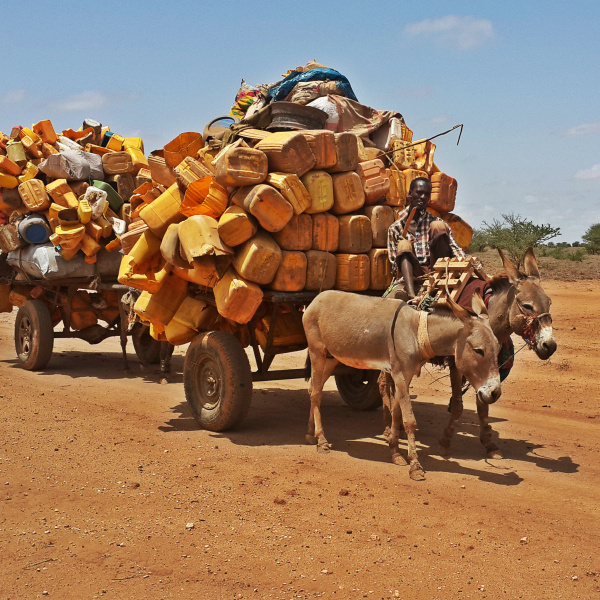Ethiopia's national donkey herd is critically undervalued and faces a significant threat from the global skin trade, according to new research carried out by international animal welfare charity, The Donkey Sanctuary.
The Donkey Sanctuary collaborated with researchers from Bristol University's Veterinary School and the London School of Economics on the project.
Research focussed on four locations in the Oromia region of central Ethiopia, investigating the role donkeys play in shaping human livelihoods. The research found that donkeys develop and sustain livelihoods and generate income for the most marginalised communities; it also found that their economic contribution is overlooked in development policy and needs urgent revaluation. The research highlights the need to include donkeys in livestock and food security frameworks.
Ethiopia has approximately 8.8 million donkeys, the largest population in Africa. These animals are often visible in rural areas - on roadsides carrying vital supplies of clean water and firewood for homesteads or pulling carts with goods to trade at market.
Less visible is the contribution they make to the development and support of people's livelihoods in semi-urban and urban environments. In these areas, they provide transport, food security and income generation as well as freeing up women for work and enabling their children to go to school.
There is a common saying in Ethiopia: "A farmer or woman without a donkey becomes the donkey."
Having access to the traditional beast of burden, gives women the opportunity for a less marginalised, more productive role in society.
Dr Zoe Raw, Head of Global Research at The Donkey Sanctuary said: "Working donkeys and mules are the backbone of rural economies in Ethiopia. They play a central and critical role in supporting poor and rural communities, providing people with a means to earn a living, transport goods, collect water or enable their children to access education. Unfortunately, the remote and marginalised nature of these communities means that they are often overlooked by national or global policy. This piece of work provides robust, scientific evidence to demonstrate the value that working donkeys and mules provide in Ethiopia, and strengthens our message that working animals have a critical role to play in human livelihoods and in development."
Martha Geiger, Centre Manager, Firoz Lalji Centre for Africa at The London School of Economics and Political Science said: "Our research reveals donkeys are pivotal actors in shaping and supporting community livelihoods in rural, peri-urban and urban areas of Ethiopia. Not only are they important at community level, they also hold individual value to their owners providing people with a sense of kinship, relief, and pride. Yet, the socio-economic contributions made by donkeys are often ignored in government processes, which favours ruminant livestock. As a result of their lack of protection, they are now more vulnerable to the skin trade, which could see their population decimated in the coming years. Consequently, those who depend on donkeys would find themselves in precarious positions with their livelihoods in question".
The skin trade is an additional challenge for these undervalued animals with the escalating demand for their skins as raw material in the production of a traditional Chinese medicine called ejiao. The medicine claims to promote health and vitality as well as treat various conditions such as anaemia.
The research, focussing on direct contact with local community groups, revealed donkeys to be a critical source of support to households, creating economic security, empowerment to marginalised groups - including women and the very poor - as well as providing a sense of companionship to their owners.
One donkey owner, speaking on condition of anonymity, said: "I speak to my community members about the benefits of having donkeys and I advise people to buy donkeys. People who do not own donkeys are under-privileged, not respected and underestimated. They are the poorest of the community. Those who don't have donkeys are in definite poverty."
Research highlighted several key themes on why working animals should be included in policy making in Ethiopia and across African countries: donkeys are generators of income; donkeys can enhance social status; working with and owning donkeys empowers women in particular and helps address gender imbalance; donkeys reduce social vulnerability and encourage resilience; donkeys provide companionship as sentient beings.
The research concludes that donkeys are not included in livestock development programmes or economic policies in Ethiopia. Owners are thus left exposed and often fall victim to the escalating skin trade and global demand for raw materials to make a traditional Chinese medicine called ejiao.
For interviews, images and information please contact The Donkey Sanctuary press office on 01395 573124 or 07870 849563 (including out of hours) or send an email.
The Donkey Sanctuary is the world's largest equine welfare charity. Our vision is a world where donkeys and mules live free from suffering and their contribution to humanity is fully valued. We run 10 sanctuaries around the UK and Europe, giving lifelong care to more than 7,000 donkeys and mules. Our hospital treats sick donkeys and trains vets both nationwide and worldwide. Our donkey-facilitated learning programme helps vulnerable children and adults develop life skills by connecting with donkeys on an emotional and physical level. The charity operates programmes worldwide for animals working in agriculture, industry and transportation, and those used in the production of meat and skin.
